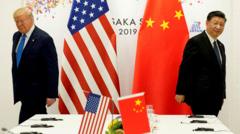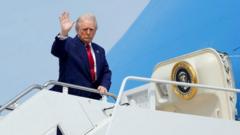The imposition of tariffs by President Trump highlights a growing rift in U.S.-European relations, raising concerns about economic stability and mutual trust.
Trump's Tariffs Create Strain on Trans-Atlantic Relations

Trump's Tariffs Create Strain on Trans-Atlantic Relations
President Trump's recent tariff decisions spark concern over the future of U.S.-European alliances.
President Donald Trump’s long-standing antagonism toward Europe has resurfaced, revealing a stark contrast to President Joe Biden’s approach of fortifying alliances against external threats, such as Russia’s invasion of Ukraine. This shift was exemplified on Thursday when Trump announced contentious tariffs targeting European allies and Ukraine, while notably exempting adversaries like Russia and North Korea.
Such tariffs serve as a poignant reminder of Trump's perspective, viewing allies as economic rivals rather than partners. With demands for NATO allies to boost military spending to 5% of GDP and controversial comments about potentially seizing Danish territory, Trump's actions threaten to undermine decades of diplomatic progress.
Economic experts, including Guntram Wolff of the German Council on Foreign Relations, warn that Trump's policies contribute to a narrative in Europe that characterizes the U.S. as an unreliable ally. Wolff asserts that these developments could alter the established dynamics of the trans-Atlantic alliance, which has been crucial for global stability since World War II.
While European leaders may strive to maintain important international relationships, they face the challenge of doing so in an environment increasingly influenced by U.S. policies under Trump. As such, the ramifications of these tariffs not only affect trade but could also inadvertently empower adversaries like Russia, casting a shadow on the future of cooperation between the U.S. and Europe.





















